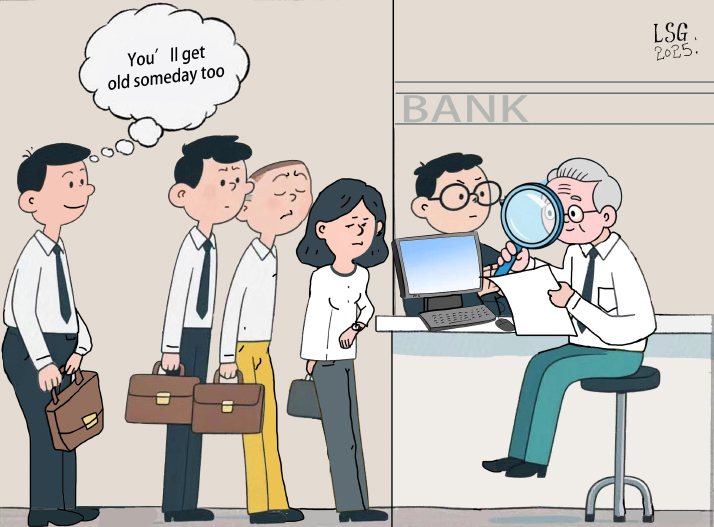| China |
| Aging workforce, rising tensions: The bank teller story sparking debate | |
|
|
 LI SHIGONG
A recent news report from Chongqing Municipality in southwest China revealed that a 58-year-old bank teller with poor eyesight had to use a magnifying glass to process transactions, causing customers to wait nearly an hour. The incident quickly sparked polarized reactions on Chinese social media: Some praised the teller's dedication and called for greater societal tolerance toward elderly employees; others criticized the bank's poor management and inefficient service, arguing that empathy for this clerk should not come at the expense of operational efficiency. The debate underlined broader tensions between workplace inclusivity and productivity expectations in an aging workforce. Wu Gang (Chongqing Daily): At its core, this issue is not about judging an employee's personal character; it is a serious matter concerning corporate management, market competition and regional economic growth. Banks exist to deliver efficient financial services, not to showcase employee perseverance as virtue. Their operational survival depends on three uncompromising fundamentals: service efficiency, transactional accuracy and customer satisfaction. In our digital era where instant transactions are the norm, requiring nearly an hour for basic banking services constitutes absolute service failure—regardless of circumstances. Assigning a vision-impaired 58-year-old teller to a high-volume frontline position reflects fundamental management failure. This is not an example of strategic deployment of experienced personnel; it's institutional mismanagement that disadvantages both employees and customers. True respect for workers means positioning them where they can thrive—whether in customer service, business consulting, staff training or back-office oversight roles where their accumulated knowhow creates genuine value. Sympathy and business operation are two wholly different things. While empathy for aging workers is natural, it cannot supersede essential service standards. Tolerating, or even praising, inefficient service under the guise of respecting seniority will encourage businesses to abandon the pursuit of excellence and efficiency. This ultimately erodes market competitiveness. This moment demands clear-eyed assessment, not sentimental platitudes. For the bank involved, this incident presents not just a public relations crisis, but also a valuable opportunity for operational realignment. Wu Lichuan (Gmw.cn): The prevailing sentiment on Chinese microblogging platform Weibo is encapsulated in the top comment on the platform: "You'll get old someday too." People's empathy toward the bank teller is understandable. Many see tolerance for this 58-year-old employee's declining efficiency as a gesture of compassion. While this bank clerk now needs a magnifying glass to work, he was undoubtedly once a sharp-eyed, skillful professional in his youth. Nobody can escape the inevitable decline that comes with aging. The situation presents a dual dilemma: an aging worker struggling with efficiency on one side and frustrated customers on the other. While this single incident may seem minor, it foreshadows growing tensions in this era of flexible retirement policies and an aging population. Similar scenarios will likely rise in other customer-facing sectors. We may increasingly see older employees relying on visual aids while struggling to keep pace with modern service demands. This echoes the broader challenges older workers face in today's fast-paced work environments. Aging workforces are becoming commonplace worldwide. While society should reasonably accommodate this demographic shift, we must balance compassion with operational realities. Each industry must objectively assess its specific demands and maintain service standards. We urgently need practical solutions that reconcile these competing needs: robust job-matching systems that align workers' capabilities with appropriate roles, retraining programs for aging employees and workplace adaptations that maintain efficiency while respecting natural limitations. Only through such balanced approaches can we achieve true win-win outcomes for both businesses and workers navigating the challenges of extended careers. BR Copyedited by Elsbeth van Paridon Comments to yanwei@cicgamericas.com |
|
||||||||||||||||||||||||||||||
|